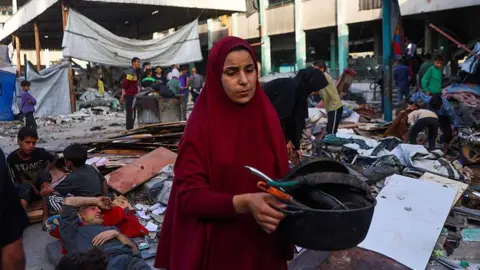In a significant political move, hundreds of lawyers in the UK are advocating for the government to impose sanctions on Israel amid the ongoing conflict in Gaza. This call follows recent military escalations and the widespread humanitarian crisis resulting from a blockade that has severely restricted aid to the Palestinian territory. A letter signed by 828 legal experts, including former Supreme Court justices, was sent to Prime Minister Sir Keir Starmer, urging him to utilize “all available means” to halt the fighting and to review current trade ties with Israel.
The letter emphasizes the urgent need for the UK government to consider imposing sanctions and travel bans on Israeli officials, highlighting the catastrophic situation in Gaza that has led to numerous civilian casualties. The signatories articulated their concerns that “genocide is being perpetrated in Gaza” and pointed to Israel’s blockade as a significant contributing factor. This latest military offensive by Israel has reportedly resulted in the deaths of hundreds of Palestinians over the past fortnight, further exacerbating the humanitarian crisis in the region.
Israel has categorically denied these genocide allegations, claiming instead that the operations are necessary to dismantle Hamas infrastructure. The International Court of Justice is currently investigating the broader claims of war crimes and violations of international law involving Israeli actions in Gaza. The legal experts involved in the initiative include high-profile figures, such as former Chair of the Criminal Bar Association of England and Wales, Andrew Hall KC, and respected professors from prestigious institutions such as Oxford and Cambridge universities.
The political landscape surrounding this issue has become increasingly charged. Recently, leaders from the UK, France, and Canada issued a joint statement expressing their condemnation of what they termed “egregious” military operations by Israel in Gaza. In response, Israeli Prime Minister Benjamin Netanyahu accused these leaders of siding with Hamas, asserting that Israel’s actions are aimed at securing the release of hostages held by the group. However, UK Foreign Secretary David Lammy countered Netanyahu’s assertions, labeling the recent escalation as “morally unjustifiable.”
The conflict has escalated, with Netanyahu declaring an intention to seize the Gaza Strip, resulting in intense military engagements that have reportedly resulted in the deaths of approximately 100 Gazans per day. The turmoil has led to a dire humanitarian situation, with aid deemed inadequate to meet the urgent needs of civilians affected by the violence. The letter from the legal experts was thorough, detailing a range of international law violations attributed to Israel’s military actions and blockade.
Furthermore, the letter asserts that the UK and other nations have a legal obligation to prevent and punish genocide, underscoring the perceived inadequacies of the UK’s current responses to the situation in Gaza. It calls for immediate financial and immigration sanctions against Israeli ministers suspected of unlawful actions and aims to ensure the UK adheres to international legal obligations, including those pertaining to the International Criminal Court regarding arrest warrants for individuals accused of war crimes, including Netanyahu himself.
As the conflict continues, the legal experts’ letter is just one of many expressions of growing international dissatisfaction with the humanitarian impact of Israel’s military actions. The group previously commented on the UK’s arms sales to Israel and the ongoing ramifications of those decisions, which are currently under scrutiny by the High Court of England and Wales.
This situation is rapidly evolving, with other countries, including Germany and Finland, also calling for humanitarian access to Gaza, reiterating the necessity of aid to reach those in dire need. Swedish officials have joined the chorus of voices demanding that Israel facilitate humanitarian assistance amidst claims of excessive civilian suffering. The ongoing conflict poses complex legal and ethical questions about international responsibility, humanitarian law, and the moral imperative to protect civilians in war-torn regions.



